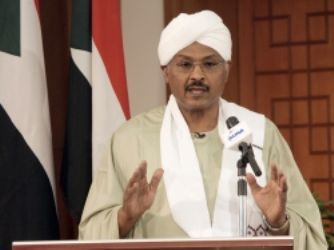Opposition figure calls for international support to comprehensive process in Sudan
September 6, 2012 (WASHINGTON) — A Sudanese opposition figure, Mubarak Al-Fadil Al-Mahdi, has called on the international community to work for a comprehensive process to end Sudan’s conflicts.

Last year, three hold-out rebel groups in Darfur and the Sudan People’s Liberation Movement North (SPLM-N) formed the Sudanese Revolutionary Front (SRF), an alliance of rebel movements calling for regime change by both political and military means.
The rebel alliance also called for coordination with the political opposition forces in Khartoum in order to bring down the regime. But the political opposition forces are divided over how to engage with the rebels.
The opposition figure of the Umma National Party called on Wednesday to review the United Nations Security Council resolution 2046, which endorses an African Union road map on the conflicts over the implementation of the Comprehensive Peace Agreement between Sudanese government, South Sudanese government and SPLM-N rebels.
“The UN Security Council Resolution 2046 should be revised to invite all stakeholders in the Sudan to the negotiating table to agree on a ceasefire to all conflicts, interim arrangements to lead to a new constitution and free elections,” Mubarak said.
He further pointed out that such approach should be motivated by the failure of previous attempts to implement separate agreements between the government of the National Congress Party (NCP) and the rebel or opposition groups.
“These piecemeal agreements, unsustainable and ineffective, only created more wars, suffering, loss of life and prolonged the misery of the Sudanese,” he stressed.
SRF forces, Popular Congress Party of Hassan Al-Turabi, Sudanese Communist Party and other small opposition forces advocate the same idea of joint political and military pressures for a regime change.
But the Democratic Unionist Party of Mohamed Osman Al-Morghani and the leadership of the Umma party, which propose negotiations with the regime for a peaceful transition, are openly opposed to this approach saying troubles in Khartoum might push Juba to occupy the disputed areas and Abyei.
They also say the unrest will lead the rebels to control some areas and to establish their authority there creating new geographical fragmentation.
But Mubarak minimised such fears stressing that the regime is weakened by its internal divisions and the army is no more willing to defend it.
He went further to say that “the army could be the conduit for transition, as happened previously in Sudan, and recently in Egypt and Tunisia.”
He backed the idea of the need to build up a new charter between the opposition and the armed movements to lay out the bases of an interim government to prepare a new constitution and to hold general elections after the fall of the regime.
Joining the calls of Yasir Arman, the SPLM-N secretary general, Mubarak said youth groups and civil society groups should be involved in these interim structures .
The comprehensive settlement or the regime change approach, according to Mubarak, will create a “new political dispensation that brings about a civil democratic state with a federal set-up and equitable wealth sharing,” and improve relations with the newly independent South Sudan.
(ST)
